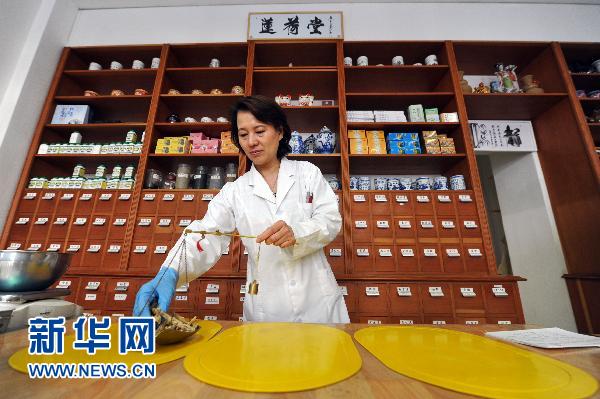TCM presence challenged by EU herbal rule
As Traditional Chinese Medicine (TCM) is expanding its presence in the global market, a disputed European Union (EU) herbal directive to be fully implemented on Sunday could be a stumbling block on the road.
| As a 2004 European Union (EU) directive on herbal medicine is to be fully implemented on May 1, herbal medicinal products without a license will no longer be allowed in the EU market, the European Commission said in a press release Friday. |
Starting from May 1, herbal medicinal products, most of which have been sold as food supplements for decades in the EU market, will no longer be allowed unless they have obtained a medicine license, according to the EU Traditional Herbal Medicinal Products Directive adopted in 2004.
The directive introduced a so-called simplified registration procedure with a seven-year transition period for traditional herbal medicinal products to be licensed, including Chinese and Indian traditional medicines.
However, as the transition period is to expire on Saturday, no single Chinese herbal medicinal product has been granted the license.
"For the time being, we can only stock as many herbal medicinal products from China as we can," said Professor Lin Bin, director of a well-known TCM clinic in the Netherlands.
The directive stipulates that applicants must provide documents showing the product is not harmful in the specified condition of use, as well as evidence that the product at least has a 30-year history of safe use, including 15 years in the EU.
With a history of more than 2,000 years, TCM did not enter into the EU market until mid-1990s, and it has been imported into the EU and sold to European customers as food supplements instead of drugs.
Most Chinese producers and importers did not reserve the customs papers a decade ago, thus unable to prove the 15-year use of their products in European markets.
Several Chinese herbal companies had tried to go through the simplified registration procedure with their ace products, but in the end they either failed or quitted midway due to lack of required documents or tight budgets.
"The directive itself was not targeting the TCM at all, but it is too difficult and expensive for TCM to register," Lin said.
The Commission stressed on Friday that the directive doesn't ban traditional medicine, vitamins, mineral supplements or herbal teas from the European market.
The Commission's health spokesman Frederic Vincent also said in an interview with Xinhua on Thursday the EU had no plan to ban anything from China and that the directive was to make sure EU citizens would be fully informed of what they were buying.
"The EU is fully aware of the importance of TCM and authorities from both sides also have some cooperation on this issue," Vincent said.
However, while acknowledging the good intention of the directive to regulate the EU's herbal market, campaigners and industry insiders argued that the new registration system was discriminative against the Chinese or Indian traditional medicine. 0
0 








Go to Forum >>0 Comments